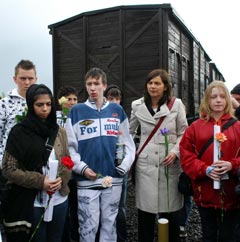



BERLIN - Als der "Zug der Erinnerung" am 8. Mai 2008 in Oświęcim (Gedenkstätte Auschwitz) Station machte, hielt die Vizepräsidentin des deutschen Bundestages Frau Katrin Göring-Eckardt eine Rede zu Ehren der ermordeten Kinder und Jugendlichen. Die Rednerin stellte grundsätzliche Überlegungen über die Fortdauer der deutschen Verantwortung für die NS-Verbrechen an. Wir bringen Auszüge:
"Our culture of remembrance has entered a crucial phase, because soon there will be no more survivors or eye-witnesses to National Socialism among us. That is why we need to address the issue of how we want to pass on the "Baton of Remembrance", as Paul Spiegel once so fittingly called it, to future generations.
Remembering and coming to terms with National Socialism should not, however, only be a state affair. As important as public rituals are, our remembering the victims of National Socialism should amount to more than mere commemoration. Civil-society initiatives and projects in our society are just as important. Only by coming to terms with National Socialism at grass-roots level can we keep the culture of remembrance alive in the long run. It cannot be taken for granted that our great-grandchildren and great-great-grandchildren will remember what crimes were committed during the Third Reich and what the Holocaust was. History will only be kept alive if we actively work on keeping it alive every day. ...
The Train of Remembrance manages to do that because it stops at public railway stations, thus exposing as a lie what people having been repeating to reassure themselves: "We knew nothing about people being deported". The Train of Remembrance calls on all of us to seek out traces in our own environment. That is why I would like projects like the Train of Remembrance to be incorporated into public education in schools and educational institutions much more. ...
The crimes committed under National Socialist rule place a responsibility on us that we never can and want to put aside. They will and should always reach into Germany's present. There is no "statute of limitations" on these crimes, as the French philosopher and musicologist Vladimir Jankélévitch once put it. The Train of Remembrance is an important piece in this puzzle of remembering that will never be completed. Only by supporting projects such as this with all our might will Germany's oft-invoked historical responsibility for the crimes of National Socialism become more than pleasant-sounding but hollow words.
I would like to thank all those who have worked hard on making the Train of Remembrance happen - despite all the set-backs. I would like to thank all those who have turned the Train of Remembrance into a living reminder for us here today."